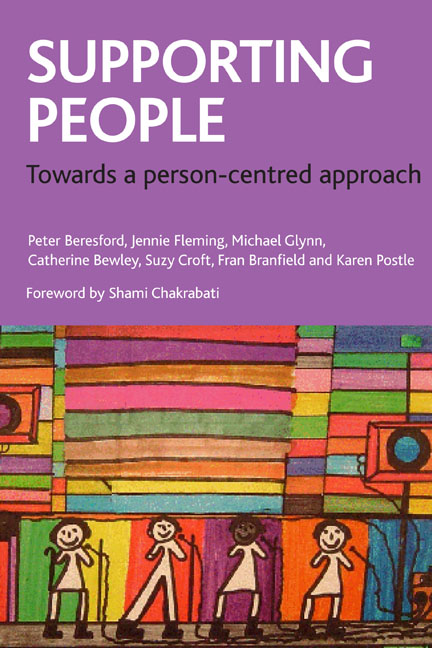Book contents
- Frontmatter
- Dedication
- Contents
- About the authors
- Acknowledgements
- Foreword
- Introduction
- Part One The Background to Person-Centred Support
- Part Two Person-Centred Support: Barriers and Ways of Overcoming Them
- Part Three Broader Issues for Person-Centred Support
- Part Four Making Change to Achieve Person-Centred Support
- Appendices
twelve - Participation
Published online by Cambridge University Press: 01 September 2022
- Frontmatter
- Dedication
- Contents
- About the authors
- Acknowledgements
- Foreword
- Introduction
- Part One The Background to Person-Centred Support
- Part Two Person-Centred Support: Barriers and Ways of Overcoming Them
- Part Three Broader Issues for Person-Centred Support
- Part Four Making Change to Achieve Person-Centred Support
- Appendices
Summary
The way that we work with people, because we consult with them, and address their concerns, it gives them the confidence to think, ‘Actually I can change things. I will make a difference.’
(Manager)Standard Eleven: Participation
Service users should be centrally involved in the planning, development, management, commissioning and evaluation of services and support. This should be made possible for all service users, addressing diversity and including people with all forms of impairment, addressing physical, communication and cultural access requirements. This demands support for both individual and collective involvement, including the adequate resourcing of service user controlled organisations.
Introduction
Public, patient and service user involvement and engagement have come to be seen as key to modern public policy and services. Social care has been at the vanguard of these developments. There have been provisions for consultation, comment and complaint in social care for both adults and children since the early 1990s. The disabled people's movement has long emphasised the importance of participation in a framework of rights and emancipation. As Clare Evans has said:
It is important to us that our involvement is based on our terms and within a background of rights: the rights that we have as citizens like any others – the democratic right to participate in society and the right to have choice and control over our lives – which must mean that we have as much choice and control as we can over the services we receive. (Evans,1995, p 116)
The Care Services Improvement Partnership (CSIP), established by government to improve social care, urged services to involve service users in making improvements.
It is vital to listen to and involve service users and carers who are the ‘experts by experience’. They can very often identify small changes or service improvements, which make a big impact. (CSIP, 2008, p 32)
The government Green Paper key to the development of personalisation, took this further, pressing for greater service user control as well as participation.
We want to give individuals and their friends and families greater control over the way in which social care supports their needs. We want to support carers to care and individuals to live as independently as possible for as long as possible….
- Type
- Chapter
- Information
- Supporting PeopleTowards a Person-Centred Approach, pp. 307 - 340Publisher: Bristol University PressPrint publication year: 2011



